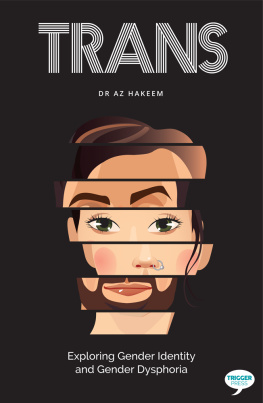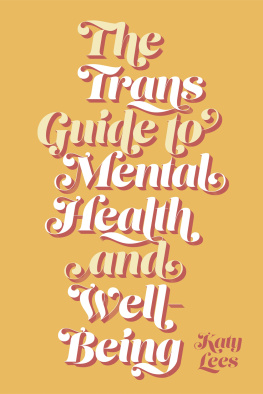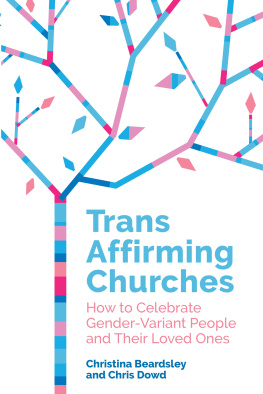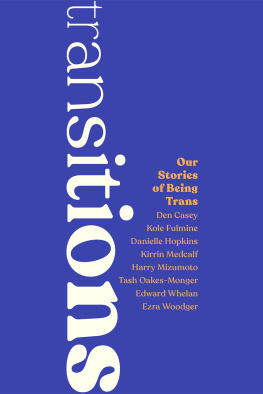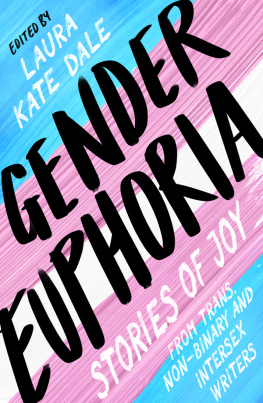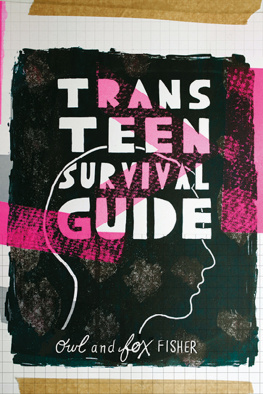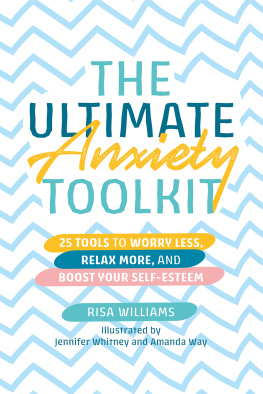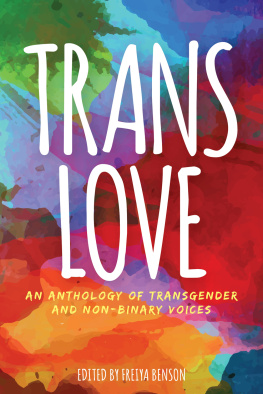Contents

The
Anxiety Book for
Trans People
How to Conquer Your Dysphoria,
Worry Less and Find Joy
Freiya Benson

Contents
Disclaimer
For the purposes of this book, Im going to be using the words trans and transgender quite a bit. Im using them as umbrella terms, to try and cover the wide range of non-cis identities out there. I identify as a trans woman, so some of the things I write about are going to be coming from that perspective, but Ive tried to include and acknowledge other identities where I can.
Its also worth mentioning that the ideas and thoughts in this book are just that: ideas and thoughts. Im not saying that what I do is also what you should do to tackle your anxiety, but rather Im offering some ways that might work for you or at least give you a starting point on your own journey with anxiety.
I hope this book helps in some way, so lets begin!
Introduction
This is a book about anxiety.
Its also a book about how that affects us as transgender, or trans, people. Its a big and complex subject, so well try and unpick it a bit, offer some ways forward, and hopefully all learn about what exactly is going on when anxiety gets its sneaky claws into us.
Anxiety isnt an easy thing both in terms of writing about it and thinking about it in part because it is such a huge subject but also because it affects us all in very different ways. One person might find crowds overwhelming, whilst another might have major anxiety around relationships or work. Some of us might have anxiety that we can mostly keep under control, whilst others will be completely disabled by theirs.
Its good to recognize this, because it also means theres no single solution or cure-all for anxiety. There are, however, some things that work better than others, and finding out what these things are is going to be a large part of what Im going to cover here.
Its important to point out that this is going to be a book based around personal experiences. Im not a doctor or a scientist or someone whos dedicated their entire life to studying anxiety, so if youre looking for something more science-based, then you probably wont find it here.
If, however, youre looking to find out more about real-life experiences from people who are maybe going through some similar types of stuff to you, then maybe, just maybe, this book might be for you!
As well as my own perspectives, this book will include other peoples. There will be short sections, handily titled Anxiety notes , filled with quotes and thoughts from other trans and non-binary people, in response to particular questions about how they manage their anxiety.
Some of the stuff in this book might seem sort of basic, or obvious, but often the most effective ways of dealing with things are the simplest ways. There is great power in simplicity, and, actually, over-complicating things can often just lead to more anxiety!
Hopefully, youll find some useful tips and ways of managing anxiety within these pages. Just so you know, all these methods have been tried and tested, either by myself or other trans people I know, because although its important to talk about when and why, its also really important to talk about what we can do to make things better.
What Im all about
So, hi, Im Freiya! Im a writer and author, and Im super-anxious a lot of the time.
Im also trans, which is something Im very proud of, but it can also make my anxiety a bit of a mare sometimes. I say sometimes, but I really mean quite a lot of the time.
I cant remember the first time I felt anxious but I know anxiety like an old friend. Its been a presence in my life for as long as I can remember, both pre- and post-transition.
Sometimes I feel it less and sometimes its so powerful and overbearing that I think Im going to die. Its always present, though, like a siren from an ambulance, barely audible in the distance. Youd better be ready, it wails, because Im coming. You dont know when, or how, but someday soon something is going to happen and then BAM! Im back, baby, your old friend anxiety.
And the thing is, there are so many ways anxiety can happen. Its triggered by a multitude of events, scenarios and feelings. It sometimes (often) feels inescapable, acting as this consistent and harsh voice in your head, always ready to chip in and knock you down, screaming warnings about everything, and just basically tricking you into expecting the worst possible outcome for everything you do. Like I said before, its a bit of a mare.
The when and who of anxiety
So, what is anxiety exactly?
Well, for starters, its completely normal and its been happening like forever. Anxiety isnt a new thing its just that the language around it has evolved.
Hippocrates (an ancient Greek physician) wrote about anxiety over 2000 years ago in the Hippocratic Corpus. In it, he writes about a man called Nicanor, who loved a good party. Unfortunately for Nicanor, whenever he went to one of these get-togethers, he started getting very bad anxiety every time the flute-girl started playing. As soon as he heard the sound of the flute, a terrible fear took over him. He said that he could hardly bear it, especially at night, and that these symptoms continued to persist over a long period of time. For Nicanor, this wasnt ideal as he really loved a good party, but his anxiety was kind of ruining things for him.
This was one of the earliest written examples of someone suffering from anxiety but it certainly wasnt the only one from ancient times. In Greek and Latin literature, the philosophers and scientists of the time would write about angor , or anxiety, as we now know it. They would write about the way angor affected people, often describing it as a constricting and narrowing disorder, which is actually pretty relatable. This is where the English word anxiety comes from originally: the Latin word angor (roughly meaning mental anguish, distress or torment, or to constrict), along with the related word angustus (which roughly means narrow). The idea of narrowness and anxiety also appears in Hebrew in the Bible, where Job (famous for being a prophet and being tested by God quite a lot) talks about the narrowness ( tsar ) of his spirit in relation to his anguish, which was brought about by all the testing of his faith (Job 7:10). Going forward in time a little, the word evolves into the Latin anxietas , and the German word Angst .
Back in Hippocrates day, people also wrote about ways that you could free yourself from the effects of anxiety, often describing techniques we still use today, such as trying to live a carefree life, living in the moment and following the path of Stoicism.
Stoicism isnt something youd necessarily think about in terms of helping with anxiety, but its something that is surprisingly relevant to our ways of being in todays world. Stoicism says that how we behave affects our happiness and that the key to happiness is to behave in a virtuous way. Basically, try to be kind and nice, even when things get tough. The thinking behind this is that we dont always have control over the external events and occurrences that affect us, but what we do have is control over ourselves and how we respond to things. Stoicism is sometimes described as not being about complicated theories or debates but rather about finding ways to overcome destructive emotions, such as anxiety or depression, and doing what we realistically can to make things better.


